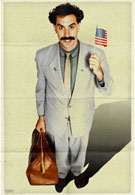Movie review: Borat
Offensive and racist or a sharp criticism of American stereotypes and culture? Chris, 16, says this hit comedy is some of both.

In the trailer for the movie Borat, the title character announces that he is a Kazak journalist bound for America riding in what looks like a blue, rusted car made during the dominance of the Soviet Union. As he waves goodbye to his friends and family in his shanty neighborhood, the camera zooms out and we find out that the car is being pulled by an oxen instead of an engine.
Based on this trailer, which I watched repeatedly in the weeks before the movie came out, I expected a hilarious movie.
I was disgusted with Borat, however, and left the theater about an hour into the movie because there were so many offensive parts. It wasn’t until later that I realized that his politically incorrect remarks were really intentional (or perhaps unintentional) criticisms of American culture.
Borat, played by comedian Sacha Baron Cohen, looking ridiculous in a thick mustache and gray suit, journeys to United States where he makes a documentary for the “Cultural Learnings of America for Make Benefit Glorious Nation of Kazakhstan.” After seeing Pamela Anderson on Baywatch, he travels across the country to find her in California. The movie is a staged documentary where he interacts with real people.
Ten minutes into the movie, I recognized all the funny scenes I had seen in the trailer, but the only problem was that I wasn’t laughing as much as I had expected. I realized why when my friend Tim leaned over and told me, “Damn, I shouldn’t have brought girls to watch this movie.” Suddenly we saw Borat masturbating in front of a Victoria’s Secret store on a busy Manhattan sidewalk. I glanced over to my right after the scene, and my two female friends weren’t laughing. I must say that the shocked looks of pedestrians on the street were funny, but am I supposed to laugh at something someone else finds offensive?
Borat is portrayed as an innocent foreigner who struggles to interpret American culture, but he purposely acts surprised that his anti-Semitic remarks, glorification of prostitutes or overly horny behavior is not appropriate in America. Although Sacha Baron Cohen is a Jew himself, he makes many disturbing remarks about Jews. Upon entering a gun store in Texas he asks, “What kind of a gun would you recommend to kill a Jew?” Hearing stifled chuckles in the theater bothered me the most. How is that funny? Of course I make fun of my own Chinese heritage and customs sometimes, like how Asians pronounce their “L” as “R,” but not to the extent where I’m talking about killing someone.
Two of my friends stayed and enjoyed the movie a lot. They were not bothered by the vulgar humor but retold scenes that I had missed, which turned out to be funny. Don’t get me wrong, the movie is a comedy, and I realized that aside from the many offensive remarks, the movie is really a satire of America.
I remember watching a scene from the trailer where at a rodeo, Borat announced his support for the war of terror and called George Bush a “war overlord.” Although Borat’s comments are rarely politically correct, statements such as, “I hope President Bush drinks the blood of every man, woman, and child in Iraq,” are highly exaggerated, thus funny, examples of scathing criticisms that expose the wrongs of America’s war in Iraq. Wearing a dress shirt that resembled the American flag, he then begins singing the Kazakhstan national anthem in front of patriotic Americans, providing comic relief.
His over-sexed behavior is a reflection of American pop culture where sexiness is advertised on television and daily life. Masturbating in front of Victoria’s Secret may be offensive to us, but the truth is that lingerie is widely exposed in America while it isn’t so in other parts of the world. (And in my local mall, the Victoria’s Secret store is right next to the Disney store.)
Now that I realize Borat’s journey mocks American culture, his country of Kazakhstan, and many politically incorrect issues, I want to give the movie another chance. As my friend said, it’s just a movie after all.

